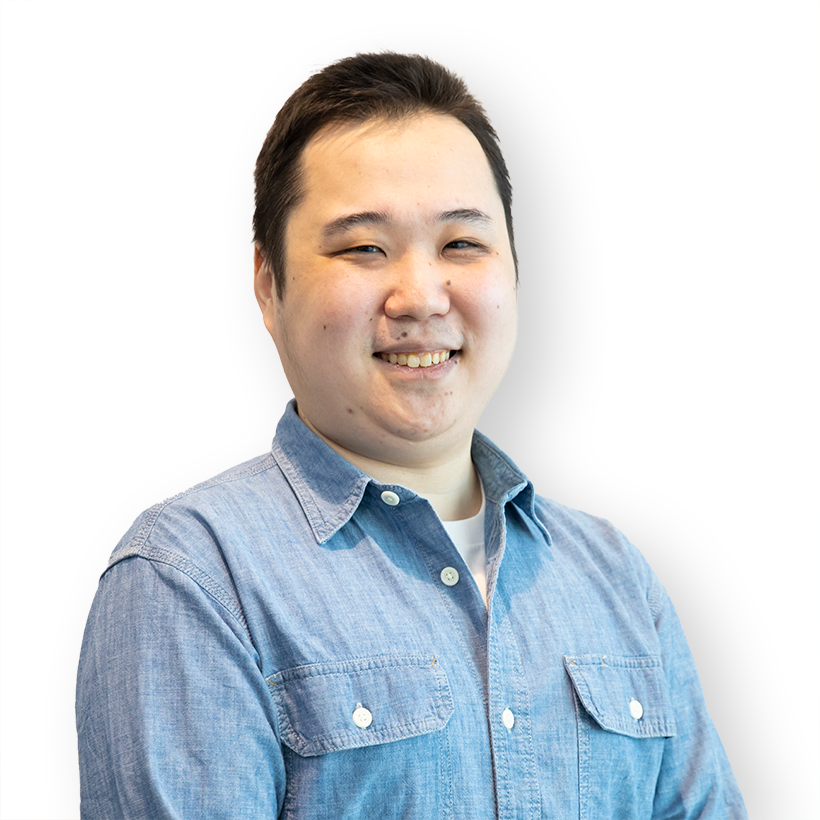【 Interview Movie 】
From mobile games to console games
My job involves developing "Sonic" titles. I've been responsible for creating enemy and object behavior as well as resource embedding for models and effects.
I'm currently working on "Sonic Frontiers". As a client programmer, I add content directly into the game, oversee tasks for my team, and act as a liaison for other teams.
Before joining SEGA, I was an independent game designer. I mostly developed app-based games using Unity on the side. But that experience became a turning point that led me to join SEGA as a dispatch worker, where I've been fortunate to work on Sonic mobile titles.
At the time, my work consisted mostly of mobile titles, but since being promoted to a full-time employee, I've had the chance to finally work on console games as well. One of the greatest perks of being part of SEGA is having the opportunity to work on a variety of titles from mobile to console.
A sense of fulfillment in every aspect
Client programmers have to engage in frequent communication with various divisions.
To implement certain specifications given to us, or to embed designs or music, we have to have meetings with artists, sound specialists, and other departments. It is crucial that we have a clear understanding of their objectives and intentions so that we are able to recommend the necessary functions. It's a very demanding process, but also one of massive importance when it comes to making a video game. So I try my utmost to see their perspective and ensure our correspondence runs as smoothly as possible.

As new hardware is always on the horizon for consoles, it's vital for us to stay up to date on emerging technologies. Incorporating new technology can prove challenging, but it also demonstrates my own personal growth and can be incredibly fulfilling. One of the most exciting aspects of being a client programmer at SEGA is the opportunity to explore and experiment with the latest technology.
My proudest moment was getting to see my name on the credits for the first game I'd worked on here. It'd always been a dream of mine from a young age to work in gaming, so to see my name on that staff roll made me feel like my dream had finally come true. Even to this day, it remains the highlight of my career.
A team driven by one common vision: to create a phenomenal game
I'm a huge fan of "Sonic", so I'd love to keep working on Sonic titles, but at the same time, I wouldn't mind working on a completely new IP and pioneering fresh new gameplay elements.
There're still a lot of fields I've not dipped my toes into yet, so I'm always looking forward to the next challenge. SEGA frequently organizes workshops, so I make a conscious effort to attend as many as possible to expand my skill set.

I think the best part about working at SEGA is that you're free to offer your opinion regardless of your professional background—it doesn't matter if you're a programmer, an artist, or a game designer, your voice is equally valued. There's something really special about getting the chance to work as a tight-knit team and having spirited discussions, all for the sake of producing an exceptional game. I'm excited about the prospect of working alongside more like-minded gamers who share the same passion, especially those with a strong appetite for learning new things.
Come join SEGA and let's create an unforgettable game together!
10:00 AM Work begins with me reading and responding to emails and messages, and checking my duties for the day.
10:30 AM Game implementation: I work my way down, starting with the highest-priority items.
12:30 PM Break for lunch. I usually take a light nap after eating or play games with my coworkers.
1:30 PM Specs meeting: The planning department asks us for our opinion on adding specific features, and we give them suggestions on what functions would be necessary. This is also where we address and resolve any lingering uncertainties.
3:00 PM Progress meeting: Each team member shares their progress, and we work to settle any issues that have emerged in implementation.
4:00 PM Game implementation: I add fixes to the automated bug report system and resolve any issues reported by the planning department.
7:00 PM Work day ends. I usually play games with friends after work, or watch a movie.

STAFF INTERVIEWS



























